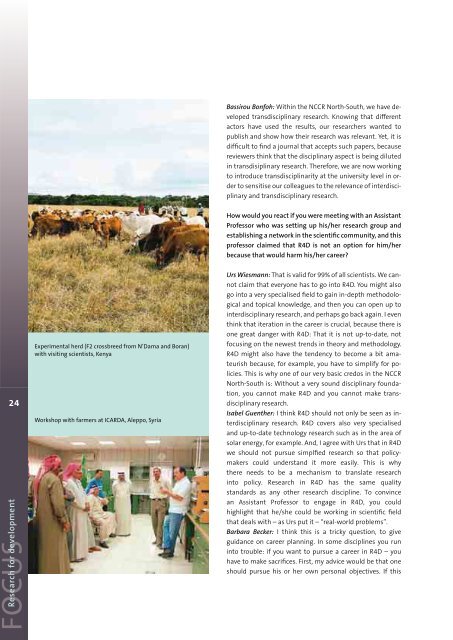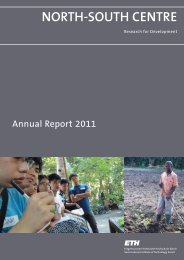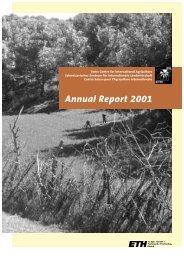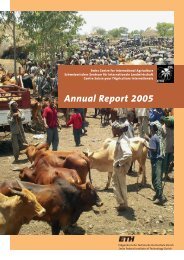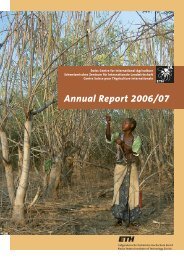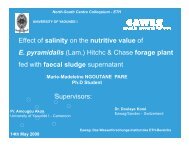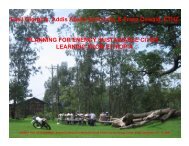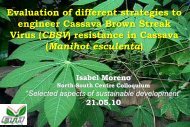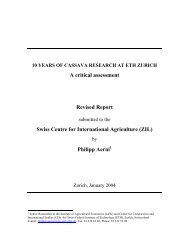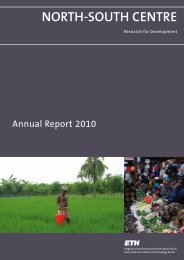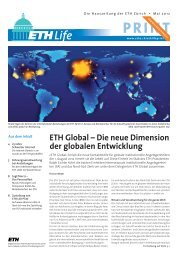NORTH-SOUTH CENTRE - ETH - North-South Centre North-South ...
NORTH-SOUTH CENTRE - ETH - North-South Centre North-South ...
NORTH-SOUTH CENTRE - ETH - North-South Centre North-South ...
You also want an ePaper? Increase the reach of your titles
YUMPU automatically turns print PDFs into web optimized ePapers that Google loves.
Bassirou Bonfoh: Within the NCCR <strong>North</strong>-<strong>South</strong>, we have developed<br />
transdisciplinary research. Knowing that different<br />
actors have used the results, our researchers wanted to<br />
publish and show how their research was relevant. Yet, it is<br />
difficult to find a journal that accepts such papers, because<br />
reviewers think that the disciplinary aspect is being diluted<br />
in transdisiplinary research. Therefore, we are now working<br />
to introduce transdisciplinarity at the university level in order<br />
to sensitise our colleagues to the relevance of interdisciplinary<br />
and transdisciplinary research.<br />
How would you react if you were meeting with an Assistant<br />
Professor who was setting up his/her research group and<br />
establishing a network in the scientific community, and this<br />
professor claimed that R4D is not an option for him/her<br />
because that would harm his/her career?<br />
24<br />
FOCUS<br />
Research for Focus development<br />
Experimental herd (F2 crossbreed from N’Dama and Boran)<br />
with visiting scientists, Kenya<br />
Workshop with farmers at ICARDA, Aleppo, Syria<br />
Urs Wiesmann: That is valid for 99% of all scientists. We cannot<br />
claim that everyone has to go into R4D. You might also<br />
go into a very specialised field to gain in-depth methodological<br />
and topical knowledge, and then you can open up to<br />
interdisciplinary research, and perhaps go back again. I even<br />
think that iteration in the career is crucial, because there is<br />
one great danger with R4D: That it is not up-to-date, not<br />
focusing on the newest trends in theory and methodology.<br />
R4D might also have the tendency to become a bit amateurish<br />
because, for example, you have to simplify for policies.<br />
This is why one of our very basic credos in the NCCR<br />
<strong>North</strong>-<strong>South</strong> is: Without a very sound disciplinary foundation,<br />
you cannot make R4D and you cannot make transdisciplinary<br />
research.<br />
Isabel Guenther: I think R4D should not only be seen as interdisciplinary<br />
research. R4D covers also very specialised<br />
and up-to-date technology research such as in the area of<br />
solar energy, for example. And, I agree with Urs that in R4D<br />
we should not pursue simplfied research so that policymakers<br />
could understand it more easily. This is why<br />
there needs to be a mechanism to translate research<br />
into policy. Research in R4D has the same quality<br />
standards as any other research discipline. To convince<br />
an Assistant Professor to engage in R4D, you could<br />
highlight that he/she could be working in scientific field<br />
that deals with – as Urs put it – “real-world problems”.<br />
Barbara Becker: I think this is a tricky question, to give<br />
guidance on career planning. In some disciplines you run<br />
into trouble: if you want to pursue a career in R4D – you<br />
have to make sacrifices. First, my advice would be that one<br />
should pursue his or her own personal objectives. If this


